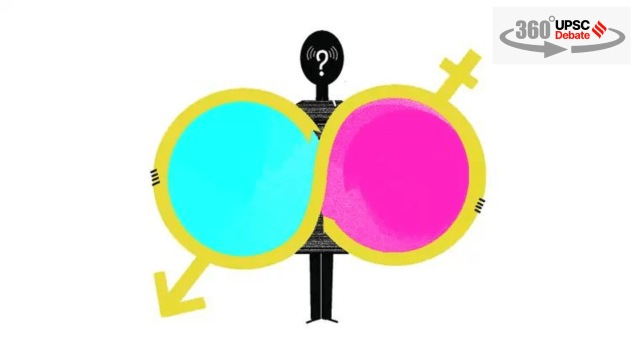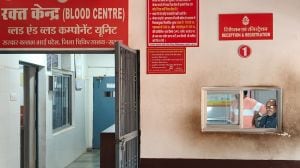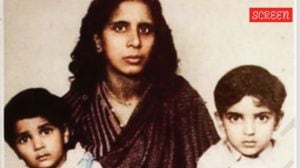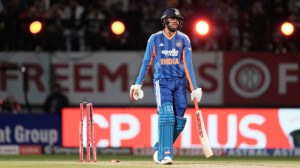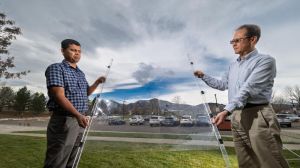The report presented by the Standing Committee on Personnel, Public Grievances, Law and Justice to Rajya Sabha on August 3 proposes that the Union Ministry of Home Affairs (MHA) should consider extending reservation benefits to transgender people in the Central Armed Police Forces (CAPFs) and implement measures to facilitate their recruitment. The trans community has faced societal discrimination and marginalisation in many ways, including access to social equality, social rights, education, and employment opportunities. The proposed inclusion of transgender individuals in the armed forces has ignited a discussion regarding the preparedness of the Indian forces to integrate them.
Employment rates of transgenders in India: Know the Data
According to the 2011 census in India, the transgender community accounts for a total of 4.88 lakh individuals. However, only a limited number of individuals are able to secure employment prospects. Based on a study done in 2018 by the National Human Rights Commission, it was found that a significant majority (96%) of transgender individuals face employment discrimination, resulting in their limited access to decent career opportunities. Consequently, many are compelled to engage in low-wage occupations or resort to undignified means of livelihood, such as sex work and begging. The first-ever study on the rights of transgenders also unveiled that around 92% of transgender individuals experience a lack of access to engage in economic activities within the nation, with even qualified individuals being denied employment opportunities. Within the sample population, over 89% of individuals who identify as transgender expressed the belief that there is a lack of employment opportunities available to individuals possessing the necessary qualifications. According to the survey, a significant proportion, ranging from 50 to 60 percent, of individuals did not receive formal education, while those who did attend schools saw substantial levels of prejudice.
According to the NHRC, 52 per cent transgenders were harassed by their classmates, while 15 percent encountered harassment from their lecturers, resulting in the discontinuation of their educational pursuits. During that time, the employment rate of transgender individuals in private sectors or non-governmental organisations (NGOs) was merely 6 percent. Additionally, it was observed that only 1 percent of transgender individuals had a monthly salary exceeding Rs. 25,000, while the rest, specifically 26.35 percent, earned between Rs. 10,000 and Rs. 15,000. The survey additionally disclosed that approximately 23 percent of transgender individuals are coerced into participating in sex work, a profession associated with significant health hazards. Consequently, transgender individuals face a 49-fold higher likelihood of HIV infection compared to the general population.
Supreme Court’s 2014 National Legal Services Authority versus Union Of India judgement and aftermath
In the ruling of National Legal Services Authority vs. Union of India on April 15, 2014, the Supreme Court of India acknowledged that transgender individuals possess a different identity separate from those who identify strictly as male or female. Consequently, the court officially designated transgender individuals as the third gender within the framework of the Indian Constitution. On September 6, 2018, the Supreme Court of India rendered Section 377 of the Indian Penal Code null and void, therefore eliminating the criminalization of homosexuality. The Transgender Persons (Protection of Rights) Act, 2019 was subsequently enacted, wherein a transgender person is defined as an individual whose gender identity does not align with the gender assigned to them at birth. The categories encompass individuals who identify as trans-men and trans-women, individuals with intersex variants, individuals who identify as gender-queer, and individuals who possess socio-cultural identities, such as kinnar and hijra. The term ‘intersex variations’ refers to individuals who exhibit deviations in their primary sexual traits, external genitalia, chromosomes, or hormones from the typical male or female body at birth.
The Supreme Court, in its 2014 ruling, also employed the Yogyakarta Principles, which have been acknowledged by the United Nations and numerous other international platforms. The Yogyakarta Principles provide a comprehensive framework for understanding and promoting human rights in relation to gender. The Supreme Court extensively cited multiple provisions from the Universal Declaration of Human Rights (1948), the International Covenant on Economic, Social and Cultural Rights (1966), the International Covenant on Civil and Political Rights (1966), and the Yogyakarta Principles. Additionally, mention was made of the legislation implemented in many nations pertaining to the rights of individuals within the transgender community. Due to the absence of specific legislation pertaining to transgender individuals in India during that period, the Supreme Court, in accordance with Article 51 in conjunction with Article 253, and drawing upon previous legal precedents such as the Vishaka case, issued directives to both the central and state governments. These directives were to be enforced until the enactment of appropriate legislation.
Story continues below this ad
The Transgender Persons (Protection of Rights) Act, 2019 specifically stipulates that both government and private entities are prohibited from engaging in discriminatory practices against transgender individuals in areas pertaining to employment, such as recruiting and promotion. It is mandatory for every establishment to appoint an individual as a complaint officer who would be responsible for addressing complaints pertaining to the Act. However, numerous concerns and debates persist over the inclusion of transgender individuals in the Armed forces.
Argument 1: It’s not about the ability or right of transgenders but about a drastic cultural change
Legal experts have observed that the Central Armed Police Forces (CAPF), as well as the army and police forces, employ a distinct psychological approach to administration when compared to other public institutions. The recruitment of transgender individuals in the Central Armed Police Forces (CAPF) may encounter challenges due to practical considerations related to unconventional command philosophy. The proposal to incorporate transgender individuals as assistant commandants represents a hierarchical strategy, wherein the exercise of authority and supervision inside military forces entails a distinct conceptual framework. Merely attaining success in the UPSC examinations and assuming the role of an officer does not automatically confer the authority to exercise command over soldiers. In practise, upon the completion of training, a directly appointed officer is assigned
to their respective unit. Following a period of familiarisation and pre-induction training alongside soldiers, the officer assumes autonomous leadership over the company or unit. Soldiers demonstrate their obedience to the officer’s directives if they perceive the officer as deserving of their respect and compliance. Instances of command failure have been observed, leading to instances of mismanagement and, in severe situations, fratricide. The inquiry pertains not to the capacity or lawful entitlement of individuals who identify as transgender, but rather to a profound transformation within the realm of culture.
In 2019, General Bipin Rawat, the former Chief of the Army Staff, expressed his view on the LGBTQ community, stating that homosexuality continues to be seen as “unacceptable” within the Army. He further asserted that the Army, as an institution, retains a “conservative” outlook and has not undergone significant modernization in this regard. Rawat’s statement pertained to the decriminalisation of both homosexuality and adultery by the Supreme Court in 2018. Rawat asserted that the Indian Army does not hold a position superior to the Supreme Court. However, he acknowledged that certain rights afforded to civilians may not extend to members of the armed forces. “We, as members of the Indian Army, are bound by the country’s legal framework. However, when joining the army, certain rights and privileges granted to individuals by the constitution may not be extended to me”.
Story continues below this ad
The Supreme Court of India, in the significant case of Navtej Singh Johar Vs Union of India (2018), rendered a verdict that resulted in the decriminalisation of homosexuality. Nevertheless, the Indian military maintains its prohibition of it due to its adherence to a distinct legal framework. According to Article 33 of the Constitution, the fundamental rights of armed forces personnel may be subject to limitations as determined by legislation enacted by the Parliament. This implies that the Army Act, Navy Act, and Air Force Act have the capacity to curtail various liberties that are typically afforded to non-military individuals.
According to Article 33, it is within the purview of the Parliament to establish, by legislation, the extent to which the rights enshrined in the law are applicable to individuals serving in the armed services. According to the source, it is stated that the rights of individuals can be limited or revoked in order to guarantee the effective fulfilment of their responsibilities and the preservation of order within their ranks. The clause encompasses both combatants and non-combatant individuals affiliated with the armed forces, including police forces, paramilitary forces, intelligence organisations, and other associated services, rather than solely focusing on the military.
In his publication titled “Indian Army And Homosexual Soldiers” for The Journal of Indian Law and Society, Ankit Gupta asserts that the Indian Army possesses a well-established system for recruiting personnel and implements a rigorous set of regulations to govern their behaviour while in service. There are no inherent issues associated with putting homosexual and transgender soldiers to equivalent levels of physical and mental demands. However, the issue resides in completely rejecting the possibility. Hence, the requisite transformation ought to originate internally. The objective of modernisation for the Indian army should encompass not just the enhancement of weaponry but also the broadening of its perspectives and perceptions.
ARGUMENT 2- No empirical evidence that supports the argument that transgender people are unfit for service
Story continues below this ad
According to M. Michelraj, a PhD research scholar specialising in Public Administration, the transgender population in India reached its zenith of influence during the Mughal Empire. During that period, they held several significant roles, such as serving as guardians of harems and even assisting the members of the royal family. They were seen as astute, reliable, and unwaveringly devoted, and were granted unrestricted entry to all areas and interactions with the populace. However, the circumstances underwent a terrible transformation subsequent to the arrival of the British. The colonisers purportedly expressed a sense of aversion when encountering individuals who identified as transgender, and struggled to comprehend the rationale behind the considerable reverence accorded to them inside judicial proceedings. The British then designated them as a “criminal tribe” and withheld civil rights from the population.
In the case of Hina Haneefa vs State of Kerala 2020, the Kerala High Court adopted a progressive approach by granting the application based on the argument that an individual who fulfils the necessary legal requirements should be eligible for enrolment in the NCC unit, recognising their transgender identity and self-perceived gender as female. The Court issued a directive to the army, instructing them to make amendments to the NCCA, 1948 within a period of six months. These amendments are intended to enable the admittance of individuals based on their self-perceived gender
The RAND study conducted in 2016 examined the potential consequences of permitting transgender individuals to openly serve in the United States military. The study identifies a range of lessons that the Indian armed forces could glean from the policies and practises of 18 other nations that currently allow transgender troops to serve openly. The study’s findings, which highlight the importance of implementing diversity-related training within military organisations and developing comprehensive policies on transgender recruitment, can serve as a valuable foundation for Indian policymakers. These insights not only provide guidance on increasing transgender representation within the armed forces but also offer strategies for effectively addressing opposition to such inclusiveness.
As per the findings of the Brookings Institution, the deliberate exclusion of a certain demographic from receiving equitable military duty serves to exacerbate the societal stigma associated with the perceived civic inferiority of that particular group. The notion that all individuals have a duty to serve their countries in times of necessity is substantiated by Dr. Gregory M. Herek’s scholarly work titled “Sexual orientation and military service: A social science perspective.” Enabling the open and inclusive service of transgender individuals in the military would constitute a significant advancement towards achieving equality. Certain scholars have acknowledged that the integration of all individuals identifying as LGBT into military institutions transcends the realm of human rights, as it is contended that embracing diversity is vital for the long-term viability of armed forces in the contemporary era.
Story continues below this ad
Scholars contend that a lack of factual data exists to substantiate the claim that transgender individuals are unsuitable for military service. Frequently referenced are reasons that suggest a potential inclination of transgender individuals towards experiencing challenges such as depression, anxiety, and suicide ideation. However, this assertion is disputed by the observation that these same concerns are prevalent across the broader LGBT population. Despite this, many countries do not restrict transgender individuals from receiving necessary services. The mitigation of discomfort experienced by transgender individuals could potentially be achieved through the establishment of a more inclusive and supportive atmosphere, wherein they are able to openly serve without fear of discrimination or marginalisation.
For any queries and feedback, contact priya.shukla@indianexpress.com
The Indian Express UPSC Hub is now on Telegram. Click here to join our channel and stay updated with the latest Updates.

